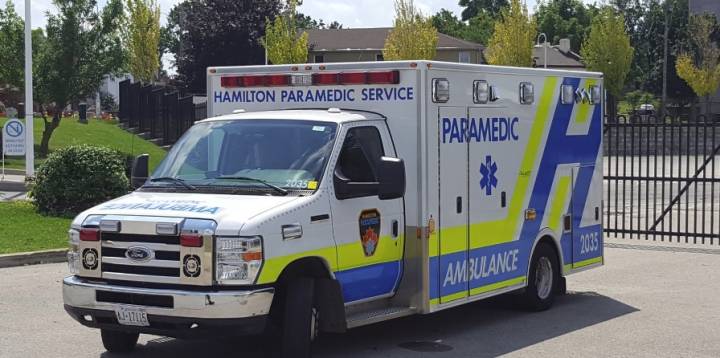Hamilton’s chief of paramedics says the number of ambulance calls, year over year, are down in the city amid the COVID-19 pandemic.

Michael Sanderson says he’s not surprised by the decline in calls during Ontario’s Emergency Measures and Civil Protection Act, but that the number is nine per cent year over year between the beginning of March and the end of April.
“So I kind of expected that we would have a decrease in transports to hospital, but it’s actually really proved out. I’m surprised at the quantum of it right now.” Sanderson told Global News.
Paramedics are not only seeing a decrease in overall calls but also a decline in potential patients taking rides to the hospital. Sanderson says on average EMS has 49 per cent of its subjects in a call refuse admittance to a hospital.
Sanderson says that’s an increase of about ten percent year over year when they averaged only 39 per cent refusing transport in 2019.
“So almost half the calls, almost half our response results in no patient going to the hospital,” said Sanderson.
The chief did not have any hard research on why, but believes there’s several factors related to the pandemic, including fear of the virus in hospitals and restrictions on having friends and family accompany patients to emergency rooms.
“It’s a range of activities and certainly social distancing. There are probably less activities going on that are creating issues. Certainly, our trauma numbers are down as well.”
Sanderson says visits connected to motor vehicle accidents, trauma in youth, and alcohol-related incidents are examples of ER categories that are down year over year for March and April.
“The calls for our paramedics where alcohol intoxication was the primary problem is actually down this year as well. So it probably speaks to some of these social activities that aren’t going on.”
Peter Bieling, vice-president of Mental Health and Addictions programs at St. Joseph’s Hospital, also believes less people on the streets is keeping many “from having a certain amount of misadventure.”
But Bieling believes a degree of fear in potential emergency room visits would also be part of the explanation.
“We don’t want people to put off coming to hospital because we have screening and testing and protective equipment. And, you know, it’s definitely safe to come, but there might be some fear,” said Bieling.
“It’ll take the aftermath of this and some careful research to figure this out.”
Questions about COVID-19? Here are some things you need to know:
Health officials caution against all international travel. Returning travellers are legally obligated to self-isolate for 14 days, beginning March 26, in case they develop symptoms and to prevent spreading the virus to others. Some provinces and territories have also implemented additional recommendations or enforcement measures to ensure those returning to the area self-isolate.
Symptoms can include fever, cough and difficulty breathing — very similar to a cold or flu. Some people can develop a more severe illness. People most at risk of this include older adults and people with severe chronic medical conditions like heart, lung or kidney disease. If you develop symptoms, contact public health authorities.
To prevent the virus from spreading, experts recommend frequent handwashing and coughing into your sleeve. They also recommend minimizing contact with others, staying home as much as possible and maintaining a distance of two metres from other people if you go out.
For full COVID-19 coverage from Global News, click here.









Comments